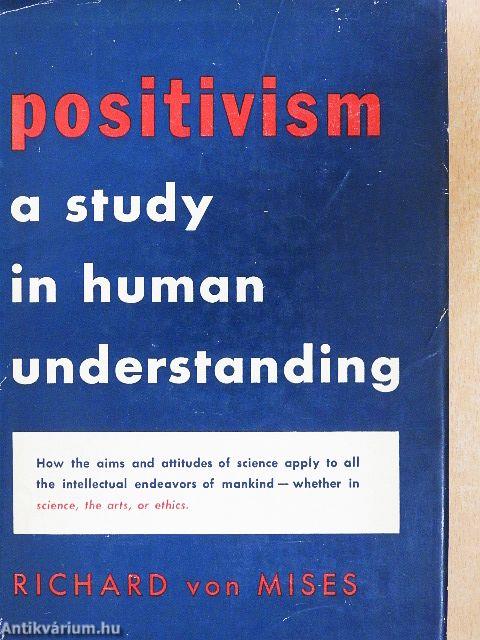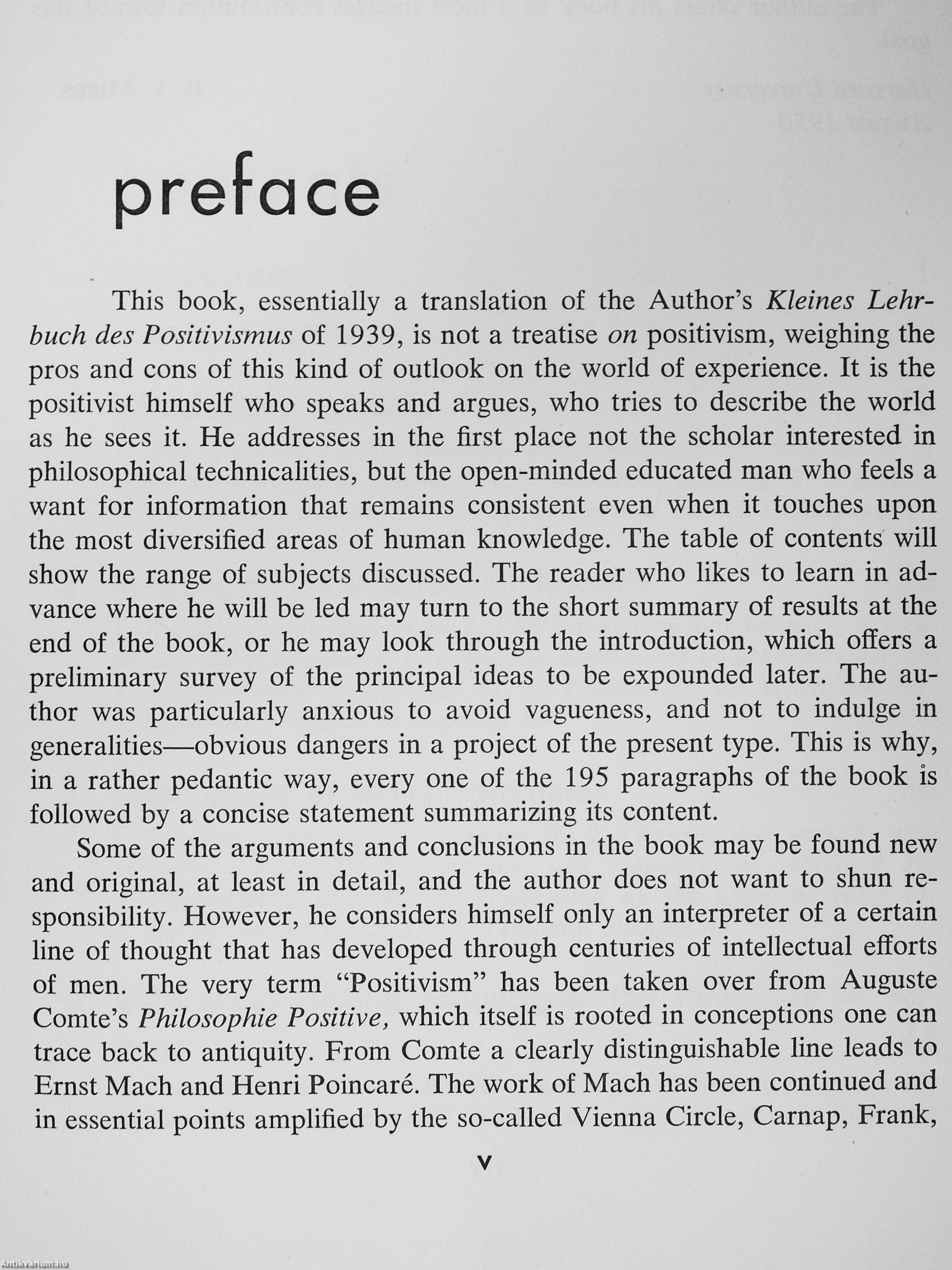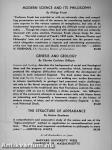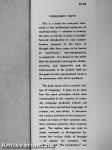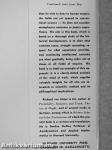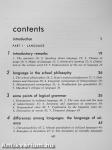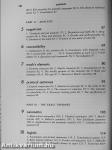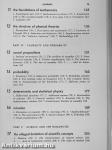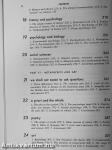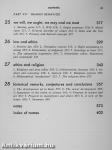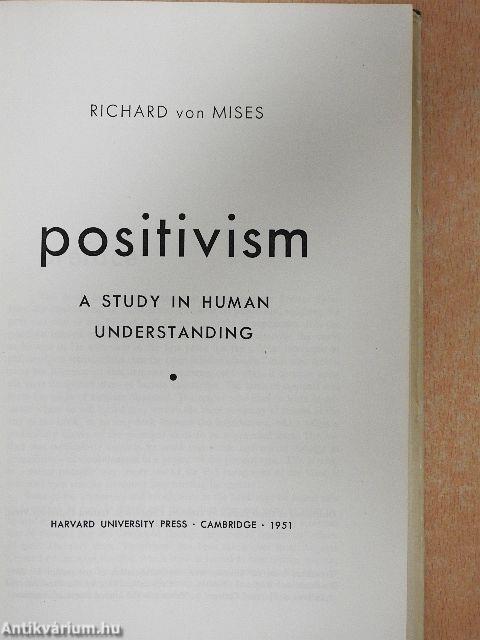1.104.039
kiadvánnyal nyújtjuk Magyarország legnagyobb antikvár könyv-kínálatát

VISSZA
A TETEJÉRE
JAVASLATOKÉszre-
vételek
Positivism
A Study in Human Understanding/How the aims and attitudes of science apply to all the intellectual endeavors of mankind - whether in science, the arts, or ethics
| Kiadó: | Harvard University Press |
|---|---|
| Kiadás helye: | Cambridge |
| Kiadás éve: | |
| Kötés típusa: | Vászon |
| Oldalszám: | 404 oldal |
| Sorozatcím: | |
| Kötetszám: | |
| Nyelv: | Angol |
| Méret: | 24 cm x 16 cm |
| ISBN: | |
naponta értesítjük a beérkező friss
kiadványokról
naponta értesítjük a beérkező friss
kiadványokról
Előszó
TovábbFülszöveg
MODERN SCIENCE AND ITS PHILOSOPHY
By Philipp Frank
"Professor Frank has provided us with an extremely clear and compelling presentation not only of the reasons for considering logical empiricism superior to the various systems of metaphysics, but also of its fundamental importance in untangling the difficult social problems of today . . . Though the essays often deal with subjects that are ordinarily discussed with some emotion. Professor Frank always keeps his voice down . . . The total content of Frank's 1941 book, 'Between Physics and Philosophy' (now out of print), is incorporated into the present work, which altogether constitutes a vigorous and entertaining presentation of the view ^hat man can, and should, stand on his own feet." —LOUIS N. RIDENOUR, The Saturday Review of Literature. $5.00
GENESIS AND GEOLOGY
By Charles Coulston Gillispie
Genesis and Geology describes the background of social and theological ideas and the progress of scientific researches which,... Tovább
Fülszöveg
MODERN SCIENCE AND ITS PHILOSOPHY
By Philipp Frank
"Professor Frank has provided us with an extremely clear and compelling presentation not only of the reasons for considering logical empiricism superior to the various systems of metaphysics, but also of its fundamental importance in untangling the difficult social problems of today . . . Though the essays often deal with subjects that are ordinarily discussed with some emotion. Professor Frank always keeps his voice down . . . The total content of Frank's 1941 book, 'Between Physics and Philosophy' (now out of print), is incorporated into the present work, which altogether constitutes a vigorous and entertaining presentation of the view ^hat man can, and should, stand on his own feet." —LOUIS N. RIDENOUR, The Saturday Review of Literature. $5.00
GENESIS AND GEOLOGY
By Charles Coulston Gillispie
Genesis and Geology describes the background of social and theological ideas and the progress of scientific researches which, between them, produced the religious difficulties that afflicted the development of science in early industrial England. The book makes clear that thé furor over On the Origin of Species was nothing new: earlier discoveries in science (particularly in geology) had presented major challenges, not only to the literal interpretation of the Book of Genesis, but even more seriously to the traditional idea that Providence controls the order of nature with an eye to fulfilling a divine purpose. Mr. Gillispie's story of the successive attempts to make nature tolly with Moses forms an interesting and frequently a humorous chapter in the history of modern science, of ideas, and of nineteenth-century England. A Harvard Historical Study. $5.00
THE STRUCTURE OF APPEARANCE
By Nelson Goodman
A comprehensive and consecutive study of the nature and use of the "logico-analytical" method in application to nonmathematical problems. "One of the most important contributions to philosophy in many years." — MORTON G. WHITE. $4.00
At all Booksellers, or from
HARVARD UNIVERSITY PRESS
CAMBRIDGE 38, MASSACHUSETTS
$6.00
PUBLISHER'S NOTE
This is o book for everyone interested in the intellectuel endeovors of monkind today — whether in science, the arts, or morals. It gives a straightforward introduction to and comprehensive synopsis of the lines of thought that have come to be known as "positivistic," non-metaphysical, or empiricist. It is based on the belief that the physicist's striving for clarity, sincerity, and objectivity and his achievements in his limited field are the goals for the unprejudiced mind in its encounters with all its problems.
The book opens with a careful critique of language. It goes on to show how the same principles which were instrumental in the creation of everyday language gradually branch out into the more specialized languages of science, art, and ethics. It discusses the various activities of the human intellect in terms of their common root, their common elements, their common goal. The author does not wish to stress contrasts or divergencies between the various fields of thought — to oppose, for example, "the sciences" and "the humanities;" nor
Continued from front flap
does he wish to deny to human enquiry the fields not yet opened to conventional science — he does not consider metaphysics nonsense or poetry superfluous. His aim in this book, which is based on a thorough study of the historical developments, is to show that common sense, straight reasoning, respect for what experience provides, and continuing intellectual curiosity are what gradually bring order out of chaos in all fields of enquiry. His book is in itself an example of this approach: it is a clearly-stated analysis of the mind at work, which supplies valuable insights for all who are interested in scientific method and its philosophical implications.
Richard von Mises is the author of Probability, Statistics, and Truth; Theory of Flight; and of several works in German, among which is Kleines Lehr-buch der Positivismus of which the present book is a revision and translation. He is Gordon McKay Professor of Aerodynamics and Applied Mathematics in Harvard University.
fel, ¦ ;
IVi';-' j./ h '¦¦•i,
iii
¦ ;•'¦. It
¦i - ti
Ul
I.
HARVARD UNIVERSITY PRESS
CAMBRIDGE 38, MASSACHUSETTS
Vissza
Témakörök
- Filozófia > A szerző származása szerint > Osztrák
- Idegennyelv > Idegennyelvű könyvek > Angol > Természettudományok > Egyéb
- Idegennyelv > Idegennyelvű könyvek > Angol > Filozófia > Nemzetisége szerint > Osztrák
- Természettudomány > Általános természettudomány > Tudomány
- Természettudomány > Általános természettudomány > Idegennyelvű > Angol
- Filozófia > Témaköre szerint > Tanulmányok, esszék
- Filozófia > Témaköre szerint > Szakfilozófiák
- Idegennyelv > Idegennyelvű könyvek > Angol > Filozófia > Témaköre szerint > Tanulmányok, esszék
- Idegennyelv > Idegennyelvű könyvek > Angol > Filozófia > Témaköre szerint > Szakfilozófiák
Richard von Mises
Richard von Mises műveinek az Antikvarium.hu-n kapható vagy előjegyezhető listáját itt tekintheti meg: Richard von Mises könyvek, művekMegvásárolható példányok
Nincs megvásárolható példány
A könyv összes megrendelhető példánya elfogyott. Ha kívánja, előjegyezheti a könyvet, és amint a könyv egy újabb példánya elérhető lesz, értesítjük.



